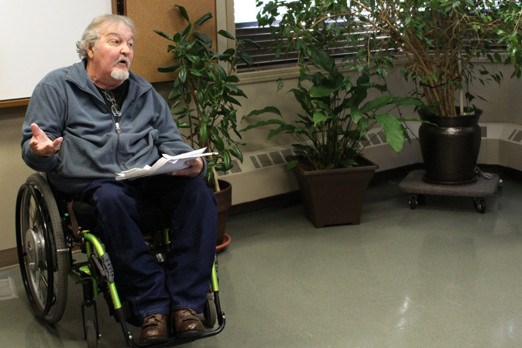Lawrence Chumyacox’s learned that his wait for living assistance is over, news the 23-year-old found bittersweet Wednesday afternoon.
Chumyacox learned that after a three-year wait he would get help for his disability through HAGI Community Services for Independence, which would allow him to live on his own in Thunder Bay where he had hopes of attending college. Unfortunately for Chumyacox, who lives with his parents in Atikokan, the assistance comes too late and he will not be able to move to Thunder Bay in time for college.
"The wait has been very frustrating," Chumyacox said, who hoped to attend school for social work. "There isn’t anything in Atikokan, it is a dead town. I’ve been waiting. I wanted to go to college but there wasn’t a place for me to live."
The life span of Chumyacox’s 24-hour assistance is also unknown and is now set to run out in March 2011, which would place the assistance back onto the negotiating table with Local Health Integrated Networks.
PUSH Northwest president Ron Ross said the service providers would continue to negotiate with the LHINs to continue services for Chumyacox, but added that while he now has assistance there are still more than 6,000 adults waiting for community support across the province.
These facts are part of what Ross calls a supportive housing and support services crisis in Ontario. Ross blames the current and past provincial governments for creating the problems.
Traditionally, people with disabilities either had to live with their families or in a longer-term facility. Ross said there should be a choice for people to live on their own with assistance to help them in their everyday lives.
"You’re not given a choice," Ross said during a PUSH Northwest news conference in Thunder Bay Wednesday afternoon.
"If you don’t require acute care and a doctor discharges you, you have to move into an institution. It is not your choice which one you move to. They have wait lists so it’s wherever they place you. If they are going to fun you $200 a day for a long-term care facility why not use that money to make a choice and purchase service help like HAGI."
Ross said he is concerned the Northwest LHIN would not accept further expansion proposals for community services as there isn’t any funding available through the regional budget for the next three years.
"We can’t be told we have to wait another three years before we receive any new funding," he said.
Sign in or register
- Messages
- Post a Listing
- Your Listings
- Your Profile
- Your Subscriptions
- Your Likes
- Your Business
- Support Local News
- Payment History
Registered Users
Already have an account?
New Users
Create a free account.
